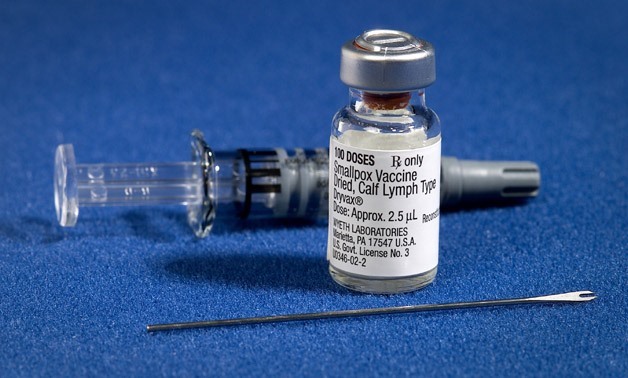
Vaccine - creative commons via Wikimedia commons
CAIRO – 23 October 2017: Vaccinations are one of the most effective ways to protect children from serious illnesses, infectious diseases and complications; including the amputation of an arm or leg, paralysis of limbs, hearing loss, convulsions, brain damage and death. If children are not vaccinated, they could easily contract any diseases that might lead to hospitalization and even death.
Unvaccinated children can also spread diseases to other children who are too young to be vaccinated or to people with weak immune systems such as those suffering from cancer, which again can have fatal consequences to these individuals.
In July, the World Health Organization (WHO) and the United Nations Children Fund (UNICEF) reported that one in every 10 children across the world did not receive vaccinations in 2016; putting them at serious risk of these potentially fatal diseases. Statistics from UNICEF on Egypt reveal that 91 percent of children aged 18-29 months were fully immunized in 2014, with 91.4 percent of them in urban areas, while 90.9 percent were in rural areas.
Raising public awareness, especially of parents, on the responsibility to protect children’s health by providing the recommended vaccinations is very vital. It is just as important to provide necessary information on the safety of vaccinations, their effectiveness, availability, timing, access and venues, as well.
What mandatory vaccinations are available for children in Egypt?
As part of the government’s commitment to protect the public health of Egyptian communities, a dedicated vaccination program was established in 1984 under the Ministry of Health, in addition to the development of national guidelines on infection control through vaccination. Available data from the WHO reveals that the coverage rate of the existing vaccination program in Egypt has greatly expanded over the years.
The program listed 10 vaccinations as mandatory and free of charge for children aged 0-18 months to ensure high coverage rates. These vaccinations include those for; poliomyelitis, tuberculosis, diphtheria, tetanus, hepatitis B, measles, mumps, German measles (Rubella) and chicken pox.
The program aims to expand the list of provided vaccination to children with a long-term vision to reduce the burden on the Egyptian health system and associated treatment cost. In 2018, the program plans to introduce a new form of poliomyelitis vaccination in the form of oral vaccinations, provided once in a lifetime, instead of injections. The head of the Preventive Medicine Sector at the Health Ministry, Amr Qandil, told Egypt Today that oral poliomyelitis vaccinations are very effective based on many countries’ experiences; especially those that have included it as part of their vaccination system.
Qandil also explained that the World Health Organization (WHO) recommended that Egypt include the oral vaccination in its program while keeping the regular injection vaccinations. He also explained that Egypt will receive 3.2 million doses of the oral vaccine in 2018 as a grant from the WHO, while the ministry will have to purchase it in the coming years to implement it as part of the mandatory vaccinations in the country.
In addition to the mandatory vaccinations, the ministry developed a preventive plan to eliminate intestinal parasites in schools. As part of this plan, the Health Ministry implements a national campaign from October 15 to October 26 in primary schools to vaccine school children against intestinal worms. So far the campaign has vaccinated 11.2 million school children across the country.
Where and when to get mandatory vaccinations?
The ministry says it vaccinates 2.7 million children every year. They follow a strategy to maintain high levels of immunization coverage among children through routine vaccinations and implementing supplementary vaccination activities.
This is done through two essential approaches; the first approach is through organizing mobile vaccination campaigns in schools yearly. In addition, all mandatory vaccinations are available in the Ministry of Health offices, health centers, and vaccination centers across the country. They are also available at university and public hospitals.
Once a child is born they receive the poliomyelitis and tuberculosis vaccination. At the ages of two months, four months and six months, the baby receives another round of poliomyelitis vaccination as well as an injection for hepatitis B, tetanus, measles, tuberculosis and diphtheria. At nine months, the baby receives the fourth dose of poliomyelitis vaccination.
At 12 months, the child receives the fifth dose of poliomyelitis vaccination in addition to vaccinations against measles, German measles (Rubella) and mumps. At 18 months, the child receives the last dose of vaccinations for poliomyelitis, diphtheria, tetanus, measles, German measles (Rubella) and tuberculosis.
The ministry also provides pregnant women with two doses of tetanus vaccinations in the fifth and sixth months of pregnancy or sixth and sevenths months.
Doctors and researchers started to work on developing vaccinations in the 1940s. The development of vaccinations can be described as a rapid process.. Vaccinations are one of the most successful stories of modern medicine and important health interventions in the history of humanity.

Comments
Leave a Comment